Jolyon Palmer column: Resilience wins day on tragic F1 weekend
- Published
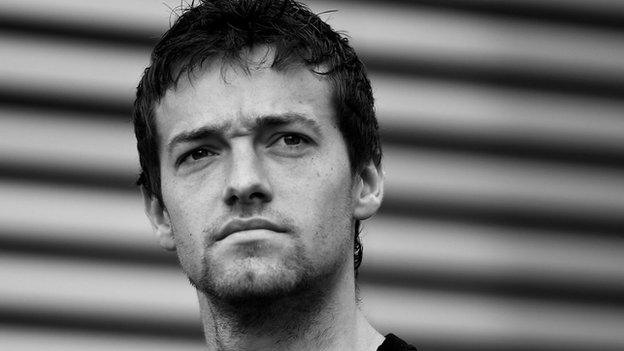
Former F1 driver Jolyon Palmer, who left Renault during the 2017 season, is part of the BBC team and offers insight and analysis from the point of view of the competitors
Formula 1 faced a tragic and sombre weekend at the Belgian Grand Prix, and the manner of Charles Leclerc's victory was a fitting reflection of the resilience required from all involved at Spa on Sunday.
Following the death of Formula 2 driver Anthoine Hubert on the Saturday, several drivers said after the race that they had not wanted to participate at all, and I can entirely understand that.
Sadly, I've been in a similar position myself, back when Henry Surtees was killed in 2009.
I was actually the car ahead of Henry when he had his accident in the old Formula 2 series, and it really shook me. I knew Henry and got on with him. This was a defining moment in my life and career where I realised this sort of thing could actually happen.
All of these young drivers will have gone through their careers without thinking they would get hurt, let alone be killed. You can't think any other way.
Safety is so good these days and drivers routinely walk away from huge crashes that in years gone by would have been catastrophic. And with the introduction of the 'halo' head protection device last year, the cars are safer than ever.
But the reality is that the sport still has inherent dangers that cannot be eradicated.
When Henry was killed 10 years ago, it woke me up to this reality. I couldn't have thought about driving the following day, but I was in a different position to the drivers in Belgium on the weekend, because I didn't have to - the next race wasn't for another month.
While the mood was still sombre when we turned up to the next race, and you get back in the car that bit more aware, it was helpful to be back into a practice session again, dialling back in at your own pace, and on a totally different circuit.
It was in many ways a tougher task for the F1 drivers last weekend.
To be aware of the severity and consequences of big accidents, have that preying on your mind and then go flat out in race conditions from the off, and through the exact same corners on which the accident happened - that requires a huge amount of mental toughness that you just can't be prepared for.
And that really was the story of the weekend.
Leclerc's almost perfect drive
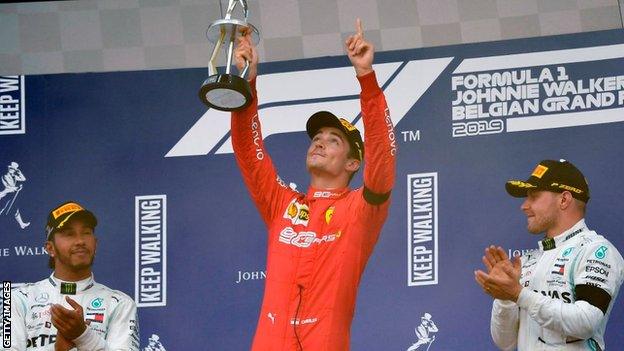
Charles Leclerc dedicated his win at Spa to Anthoine Hubert
For Leclerc, this was tougher than for most. He knew Hubert well, having raced against him on and off throughout his career, including in his very first kart race. Yet his drive was almost perfect. Indeed, his performance over the entire weekend was.
Despite taking another dominant pole position, by a huge 0.7-second margin over his team-mate Sebastian Vettel, he still had a lot of pressure heading into Sunday.
Ferrari had not won a race all season and the team and both drivers were coming under more pressure for a combined error-strewn first half of the season.
With that backdrop heading into the Grand Prix, Leclerc did everything right. He got a great start, and fundamentally had better pace than Vettel. That allowed him to look after his tyres better throughout the race and gave him a buffer to the chasing Lewis Hamilton, who was the greater threat.
Leclerc's resilience wasn't limited to just turning up and racing on Sunday, though. He had to be strong mentally to win the race as well.
He has had two race wins slip through his fingers already and as Hamilton upped the pressure with five laps to go, this was another that could have gone that way.
But Leclerc held strong despite his tyres suffering in the closing stages.
The pressure was immense. It was a situation not dissimilar to Austria, where Verstappen had a late charge and pinched the win from under Leclerc's nose with a couple of laps to go.
In Spa, though, Leclerc managed to keep just out of Hamilton's reach, making no mistakes at all and being incisive through a bunch of back markers they both had to lap in the closing stages.
This was a tremendous win for him, in the most difficult of circumstances. Now he has the first win under his belt, I feel it's just a matter of time before the second follows.
Mental toughness is something all athletes must have and F1 is no different. Leclerc has shown he has this in abundance and it stands him in brilliant stead for the future.
The fact he immediately pointed to the skies and ushered the camera to his tribute sticker for Hubert after the race, rather than getting caught up in the emotions of a first F1 victory, showed exactly where his head was in Spa. Yet he still produced a magnificent drive.
Others excel in difficult circumstances
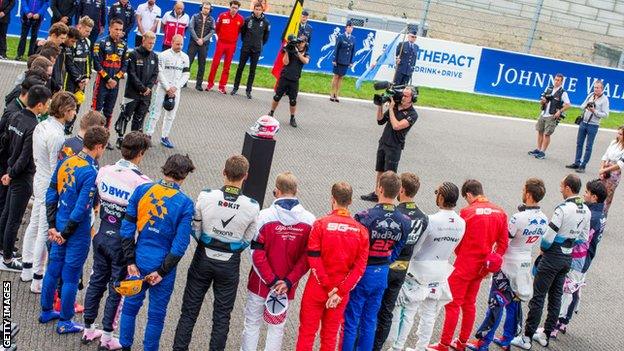
Formula 1 drivers gather to pay tribute to Anthoine Hubert before the race in Belgium
There were others who showed well in tough circumstances. Alexander Albon, Pierre Gasly and Nico Hulkenberg all finished with strong results.
Albon had a lot of pressure on his shoulders after his mid-season switch to Red Bull. The pressure was reduced somewhat by starting from the back of the grid because of an engine penalty. But the scrutiny throughout his weekend was high, more than he ever would have faced before, as he became the latest driver to find himself in a race winning car - and in only his 13th Grand Prix.
He was never going to be able to fight for a win or even a podium in Belgium. But a strong drive to fifth would have given Red Bull a lot of encouragement.
Not only did he display impressive pace at times throughout the weekend, but also some great instinctive race-craft that would have excited the Red Bull bosses.
The man he replaced, Pierre Gasly, also had a lot of attention for his move in the opposite direction. Switching back to Toro Rosso would have been tough for Gasly on the back of a tricky first half of the year at Red Bull.
It's a fairly humbling mid-season dismissal, but Gasly is still on the grid and has the potential to show Red Bull they might have been wrong, if he can produce some good drives for their junior team.
Gasly's drive was also strong, finishing in ninth place. He did end up behind team-mate Daniil Kvyat, but that was largely due to strategy. On top of this, you can't ignore the Hubert backdrop, which seemed to affect Gasly more than most - understandably.
Gasly described Hubert as one of his best mates, and they even roomed together on their way up the ranks. For him to race on Sunday was particularly tough, but he put in a drive to be proud of.
Finally, Hulkenberg found out in the week leading up to the Grand Prix that he had lost his drive for 2020 to Esteban Ocon - another old adversary of Leclerc, Gasly and Hubert.
With more pressure and a point to prove, Hulkenberg also put in a measured drive to finish eighth.
He is likely to stay in F1 next year, with another team. But it's uncomfortable for a driver to be heading into September with no drive for the following year and your current seat assigned to someone else.
The show must go on
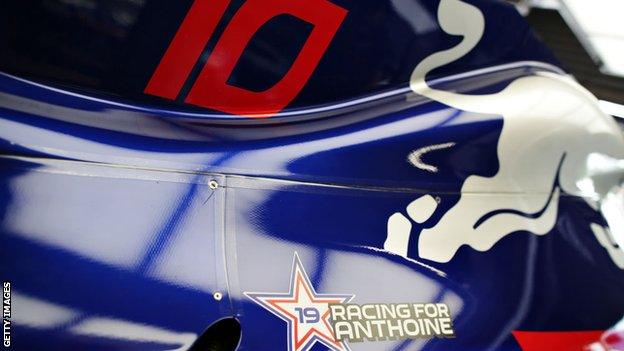
A tribute to Anthoine Hubert was painted on Pierre Gasly's car
All in all, this was a weekend from which no driver would have left with positive feelings, despite some strong results.
A death this close to home will take time to move on from, and for the younger drivers in the field, it might be a sharp wake up to the real perils that can exist in a sport we now deem so safe.
It does show, though, the mental resilience that they all have, to race in such difficult circumstances when most would rather go home and contemplate.
They race again this weekend in Monza, and the show will go on.
- Published5 August 2019
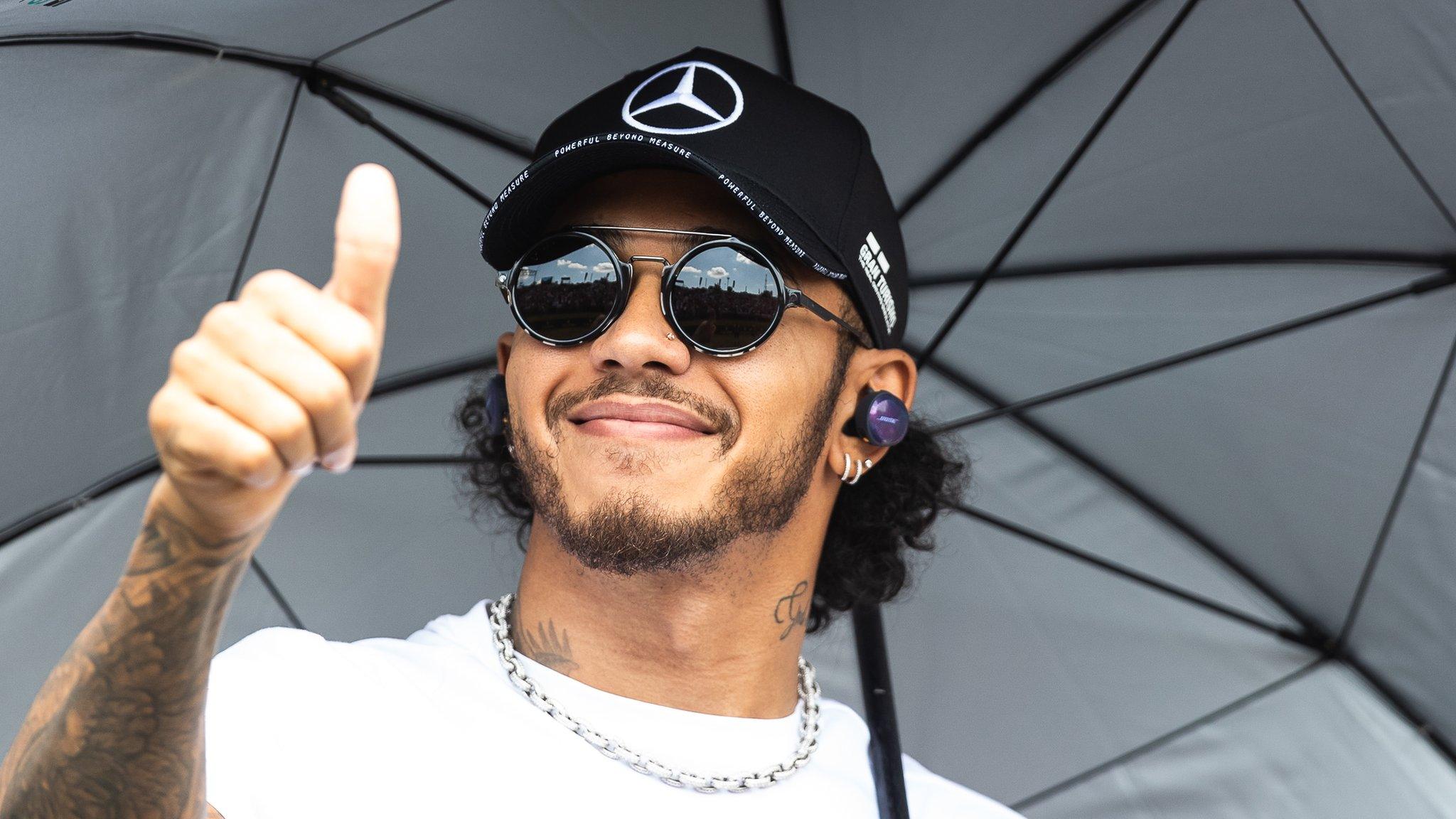
- Published4 August 2019